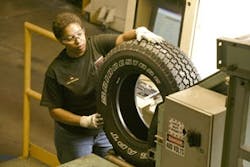BATO on La Vergne: 'Inventory, economy to blame'
Excess inventory and the global economic crunch are forcing Bridgestone Americas Tire Operations (BATO) to end passenger and light truck production at its La Vergne, Tenn., tire plant this year.
When completed, the action will permanently remove 9,400 units from the company's daily manufacturing capacity. It also will result in the elimination of 543 jobs.
Most of the consumer tires made in La Vergne are low-end, broad-line products, ranging from 15 inches to 18 inches, says Steve Brooks, president of manufacturing and operations, BATO.
In addition, BATO is reducing medium truck and bus tire production at the La Vergne plant due to lower commercial tire demand. However, the factory will continue to build truck and bus tires long-term.
"We had to make a move," says John McLaughlin, La Vergne plant manager. "A lot of planning went into this. It was a very painful, difficult decision but one that was required to keep the rest of the organization in good shape."
La Vergne's status as one of BATO's most expensive plants to operate played a role in the decision, he explains. The 36-year-old factory contains a lot of old passenger and light truck tire manufacturing equipment.
Most of the capital investment at the plant "has been on the truck tire side. On the consumer tire side, the equipment in this plant is our least modernized."
In terms of daily consumer tire production capacity, La Vergne is BATO's third largest plant in the United States, behind Wilson City, N.C. (33,1000 units per day) and Aiken County, S.C. (25,000 units per day).
BATO executives are currently negotiating severance packages with the United Steelworkers, who represent production employees at the plant.
